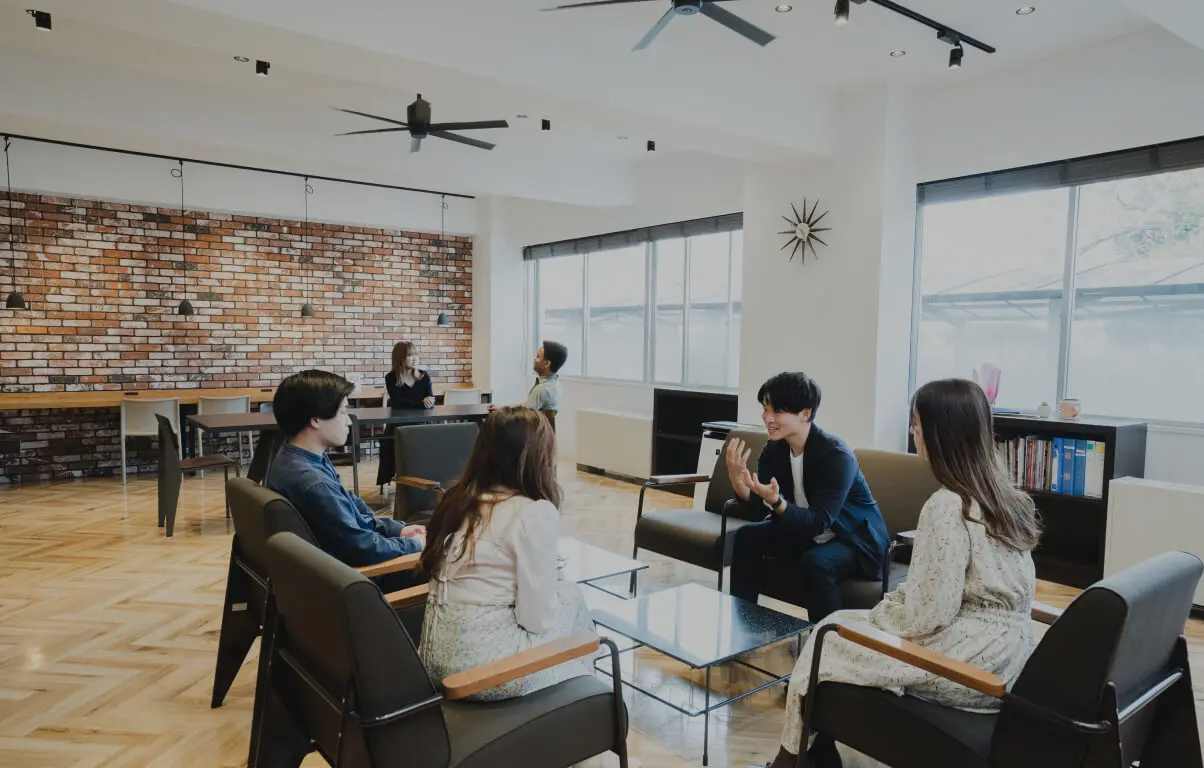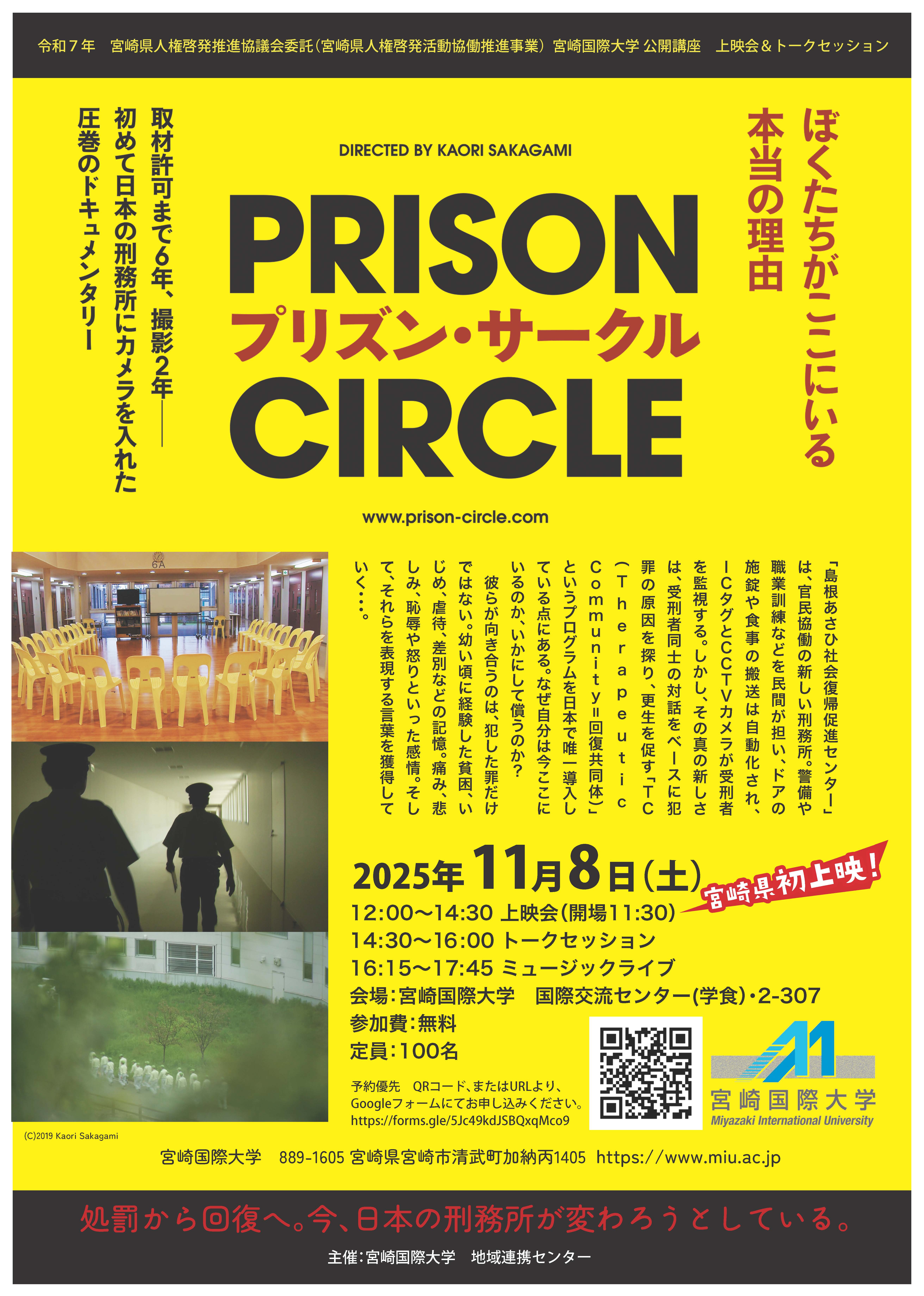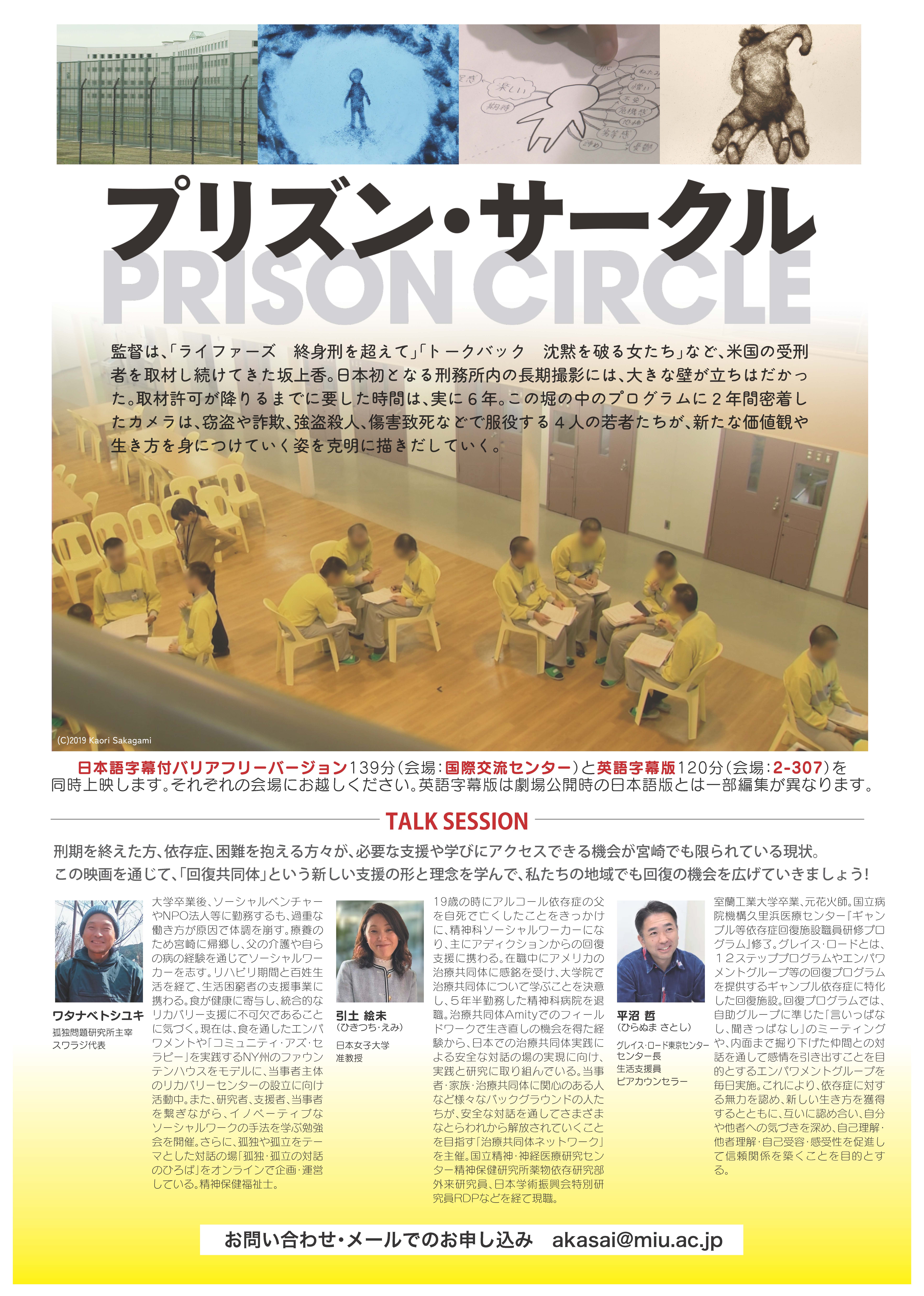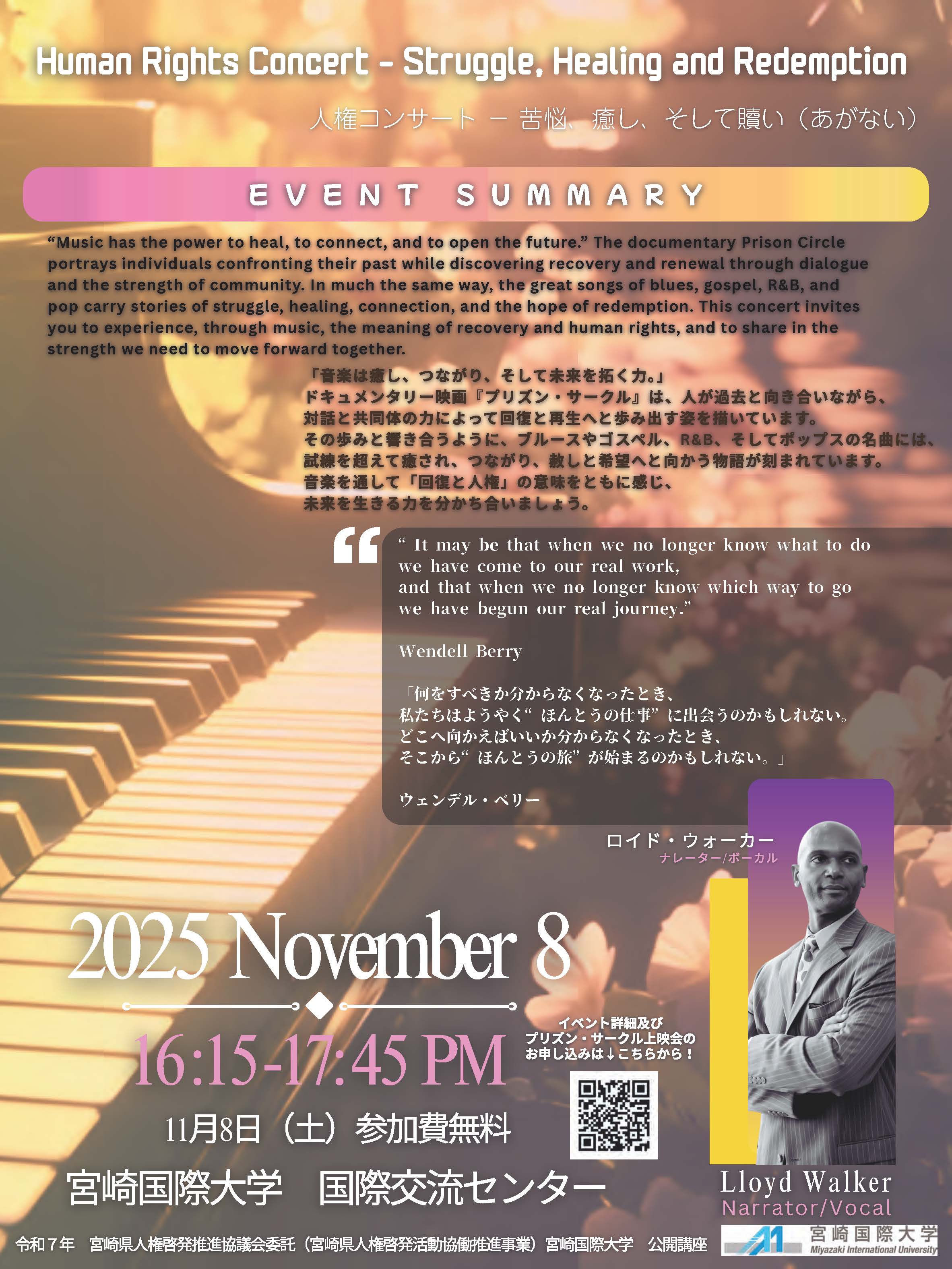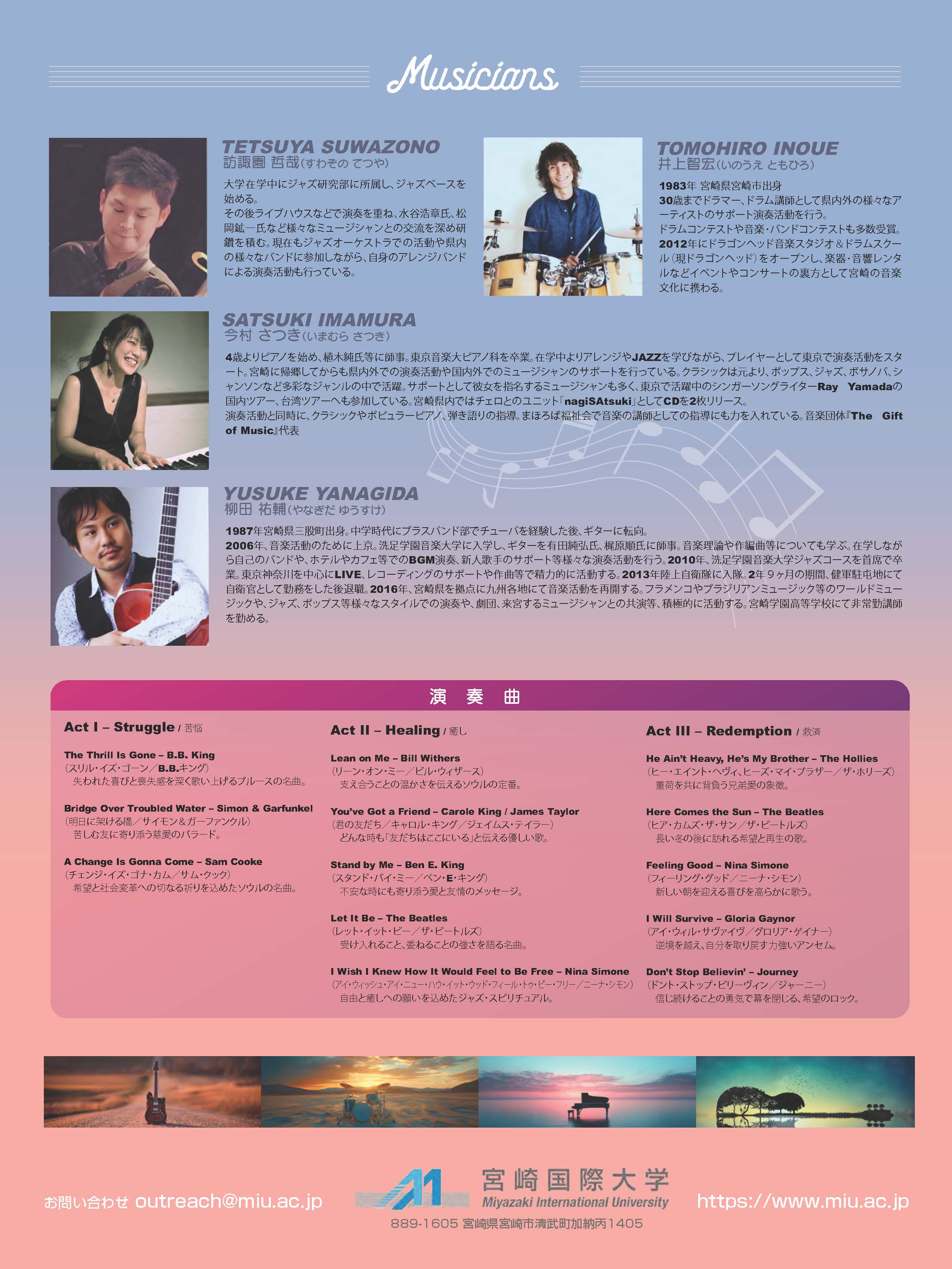Miyazaki First Premiere!“PRISON CIRCLE” Film screening, Panel Session & Concert!✨♫🎸🎤🥁
DATE:2025, November 8th (Saturday)
TIME: 12:00 (Door opens 11:30)
PLACE: Miyazaki International University
ADMISSION:Free
MAX CAPACITY:100
Main venue: International Exchange Center/Cafeteria (English subtitle version will screen in 2-307.)
(Same-day admission available, but priority will be given to participants with a reservation.)
■REGISTERATION URL: https://docs.google.com/forms/d/e/1FAIpQLSda91FAUKIGKRTCSoDNy-yfQwOXOI7W_PT_Eyboy1EruNYVDw/viewform
■Aim of the Event: In Miyazaki, people rebuilding their lives after returning to society from incarceration, people with addiction or facing other types of difficulties have limited access to necessary support and educational opportunities. Through this film, participants will learn about the “Therapeutic Community” (TC), a new form of support. We hope that this will broaden the opportunity for recovery in our local community.
■ Film Trailer : https://www.youtube.com/watch?v=xBQg9QhsNrw
■ Director’s introduction : https://www.youtube.com/watch?v=FFSHVDb8OvI
■ Program
12:00 ~ 14:30 Film Screening (Open: 11:30)
14:30 ~ 16:00 Panel Session
16:15 ~ 17:45 Concert
This is a bilingual event. Japanese subtitles with closed captions (SDH) 139 mins (Room: International Exchange Center) & English subtitled version 120 mins (Room:2-307). The panel session will be interpreted into English.
The screening will take place simultaneously in two rooms. Some parts of the film with English subtitles will differ from the Japanese version.
■What is Therapeutic Community (TC)?
In Japanese, Therapeutic Community (TC) is often translated as “chiryō kyōdōtai’” [“Treatment Community”]. However, since the Japanese word for treatment (治療: chiryō) conveys a strong image of medical and hospital settings as well as fixed roles (doctor-patient), the film uses the translation “kaifuku kyōdōtai” [“Therapeutic Community”] or refers to it as TC. TC first began in psychiatric hospitals in the UK and later spread throughout other parts of Europe and to the US in the 1960s. In TC, issues such as addiction are considered a symptom, and place the individual at the center of the treatment. It is an approach that promotes human growth by allowing communities to influence each other and acquire new values and ways of life (rehabilitation). (From the official “Prison Circle” website.)
https://prison-circle.com/
■Shimane Asahi Rehabilitation Program Center
Established in the late 2000s, Shimane Asahi Rehabilitation Program Center, is one of the 4 “PFI (Private Finance Initiative) Prisons” in Japan. It houses 2000 male inmates with unprogressive crime propensity. The HP explains as follows. “To facilitate changes in the inmates’ criminal action and social attitude, we follow the ideas of three educational pillars: TC, cognitive behavioral therapy, and restorative justice. The environment of the institution will both act as the measure for recovery and rehabilitation, and empower inmates to take responsibility for their crimes.”
■Panel Session Speakers
Toshiyuki Watanabe(Director of Swaraj)
After graduating from university, Toshiyuki Watanabe worked for social ventures and NPOs; however, due to excessive work, his health deteriorated. On returning to Miyazaki for recuperation, he was inspired to pursue a career as a social worker through his experience in caring for his father and himself. After a period of rehabilitation and living as an organic farmer, he became involved in support programs for people facing financial hardship. He recognized how food contributes to health and is essential for comprehensive recovery support—currently, working towards establishing a peer-led recovery center inspired by Fountain House in New York State, which practices empowerment through food and the concept of “Community as Therapy”. In addition, he organizes study groups that connect researchers and support practitioners and people with lived experience to explore innovative approaches to social work. Furthermore, he plans and facilitates an online forum for dialogue with a theme of loneliness and isolation called “Kodoku Koritsu no Taiwa no Hiroba” [“Forum on Loneliness and Isolation”]. Toshiyuki is a certified psychiatric social worker.
Emi Hikitsuchi(Associate Professor of Japan Women’s University)
When Emi was 19, she lost her father to suicide. He struggled with alcoholism. After this experience, she became a social worker, primarily providing recovery support from addiction. While working, Emi was inspired by the therapeutic communities in the USA, which led her to pursue graduate studies and resign from the psychiatric hospital where she had worked for five and a half years. Through her fieldwork experiences at the therapeutic community “Amity”, she became engaged in practice and research to create safe spaces for dialogue through therapeutic community practice in Japan. Emi hosts “Therapeutic Community Network,” which brings together people from diverse backgrounds – such as people with lived experience, families, and individuals interested in the therapeutic community – to promote liberation from various forms of constraint through safe and open dialogue. Emi has worked as a research fellow at the National Center of Neurology and Psychiatry Department of Drug Dependence Research, and as a Research Fellow for Young Scientists (RPD) with the Japan Society for the Promotion of Science (JSPS).
Satoshi Hiranuma(Director of Grace Road Tokyo Center, Life support worker, peer counselor)
Satoshi Hiranuma is a graduate of Muroran Institute of Technology and a former fireworks specialist. He completed “Staff Training Program for Gambling Addiction Rehabilitation Facility” at the National Hospital Organization, Kurihama Medical and Addiction Center. “Grace Road” is a recovery facility specializing in gambling addiction, offering recovery programs such as the 12-Step Program and Empowerment Group. The recovery program holds daily meetings based on the self-help group, where participants are free to just speak or listen, as well as empowerment groups which aim to bring out emotions through in-depth dialogue with peers. The aim is to help acknowledge powerlessness over addiction and develop a new way of living, promote mutual acknowledgment, deepen awareness for self and others, promote self-understanding, empathy, self-acceptance, and sensitivity, and build relationships of trust.
■REGISTERATION URL: https://docs.google.com/forms/d/e/1FAIpQLSda91FAUKIGKRTCSoDNy-yfQwOXOI7W_PT_Eyboy1EruNYVDw/viewform
Live Music! 16:15 ~ 17:45 (Program is in the flyer)
Lloyd Walker (Narration, vocal)
Music has the power to heal, connect, and shape the future. The documentary film “Prison Circle” portrays people confronting their past and embarking on a path toward healing and rebirth, guided by the power of dialogue and community. Echoing such journeys, classic blues, gospel, R&B, and pop melodies resonate with stories of endurance and healing, connection, forgiveness, and hope. Through music, let us feel the spirit of “healing and human rights”, and share the power to live with an eye toward the future.
Tetsuya Suwazono(Bass)
While attending university, Tetsuya joined the Jazz Club and started playing jazz bass. He performed at live venues and developed musicianship through interactions with a wide range of artists, such as Hiroaki Mizutani and Koichi Matsukaze. He currently performs with jazz orchestras and various local bands across the prefecture and creates and performs original arrangements.
Tomohiro Inoue (Drums) Director of Dragonhead
Born in 1983 in Miyazaki, until the age of 30, Tomohiro worked as a drummer and drum instructor, supporting numerous artists across and beyond the prefecture. He has received multiple awards in drum competitions, including a number of music and band contests. Tomohiro established Dragonhead Music Studio & Drum School (currently known as Dragonhead) in 2012 and has contributed to Miyazaki’s music culture behind the scenes, providing instrument and sound equipment rentals for events and concerts.
Yusuke Yanagita (Guitar)
Born in 1987, Mimata, Miyazaki Prefecture, Yusuke began playing tuba in his middle school brass band before switching to the guitar. In 2006, he left home to pursue a music career. Upon enrollment at Senzoku Gakuen College of Music, Yusuke studied guitar under Yoshihiro Arita and Jun Kawajiwara. While studying at university, he engaged in a variety of performances and activities, form leading his own band, providing background music at hotels and cafes, and supporting emerging vocalists. Following graduating with honors from the Jazz course in 2010, Yusuke become actively involved in live performances, supporting recording sessions and creating original compositions, primarily in the Tokyo and Kanagawa regions. Yusuke enlisted in the Japan Ground Self-Defence Force in 2013, serving as Self-Defence Force personnel at Kengun Garrison for two years and nine months before retiring. In 2016, Yusuke rekindled his music career across Kyushu while based in Miyazaki Prefecture. He actively performs in various styles, including world genres such as flamenco and Brazilian music, jazz and pop, and collaborates with theatre companies and musicians who come to Miyazaki. Yusuke also currently teaches as a part-time teacher at Miyazaki Gakuen High School.
Satsuki Imamura (Piano)
Satsuki started playing piano at the age of 4 under Jun Ueki and others. A graduate of the Tokyo College of Music Piano Course, she studied arrangement and jazz, and began performing as a musician in Tokyo while pursuing her studies. Since returning to Miyazaki, Satsuki has continued to perform across and beyond the prefecture and provides support to musicians both domestically and internationally. Satsuki is active in a versatile career performing across diverse genres such as classical, pop, jazz, bossa nova, and chanson. She is frequently requested by musicians as a support player and has collaborated in domestic and Taiwan tours with Ray Yamada, a Tokyo-based singer-songwriter. Within Miyazaki Prefecture, Satsuki has released two CDs as a member of the piano and cello duo “nagiSAtsuki”. In addition to performing, she provides instruction in classical and popular piano, singing, and accompaniment. She also actively contributes as a music instructor at the Mahoroba Welfare Association. Satsuki currently serves as the director of the music organization “The Gift of Music”
This event is funded by the Reiwa 7(2025) Commission of Miyazaki Prefecture Human Rights Awareness Promotion Council (Human Rights Awareness Collaboration Promotion Project )
